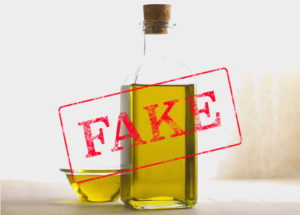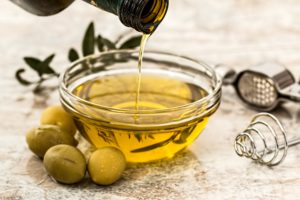
If you’ve been buying “extra virgin olive oil” thinking you are doing yourself a great health benefit, think again. You may have been buying high-quality “extra virgin olive oil” for the health benefits, but it turns out you might have been duped. According to numerous sources, most olive oil sold on the store shelves is either low grade, diluted with cheap fillers, or just an outright fake. That’s right – you’ve been swindled on both the health and financial front.
Is this possible? Could it be that most olive oil is really fake?
Well, it is not so hard to comprehend if you look at the fact that the olive oil industry is a $1.5 billion dollar industry in the US alone. It is very easy, and tempting, for an olive oil producer to just add a cheap filler then reap a bigger portion of that $1.5 billion in annual sales. After all, authentic extra-virgin olive oil takes a lot of time, expense, and labor to make. Whereas it is quick, cheap, and easy to doctor when faked.
This deception has ties to the Italian mob. The Carabinieri, which is like the FBI of Italy, arrested 33 suspects in the Calabrian mafia’s Piromalli clan, whose illicit dealings allegedly include exporting fake extra virgin olive oil to the United States. The Italian authorities seized about $42.8 million in assets and are charging the suspects with mafia association, attempted murder, drug trafficking, money laundering, and fraud.
So how much of the olive oil sold is fake? The numbers are shocking.
In April of 2011, the University of California Davis put out a study called the “Evolution of Extra Virgin Olive Oil Sold in California.” They bought imported extra virgin olive oil, consisting of the best selling brands, from store shelves in northern, central, and southern California. Of the 90 samples 66 failed. That is 73% of the samples failed to be considered extra virgin. Even scarier, many of the samples failed because of excessive oxidation and rancidity. Oxidation alone is something that should be avoided in the human body, in addition to the oil being exposed to high heat, like when cooking, because of the negative health effects.
A more recent figure comes from a 60 minuets episode, aired on Jan 3rd 2016. They investigated the imported olive oil trade and interviewed a man considered an expert on the subject, Tom Mueller. He literally wrote a book about fake olive oil, called Extra Virginity – The Sublime and Scandalous World of Olive Oil. On the episode, Mr. Mueller said, in other words, that up to 80% of all imported extra virgin olive oil does not meet the legal grades because they have been tainted with cheep fillers like sunflower oil, canola oil, or are a different oil altogether.
The unfortunate prevalence of fake olive oil is not isolated to the US. This problem is world wide. In Australia on May 5th 2016 the Sydney Morning Herald reported that “the vast majority of imported “extra virgin olive oil” in Australian supermarkets fails to meet local and international standards, renewing concerns shoppers are paying a premium for inferior products.” This research, commissioned by the Australian Olive Association, tested 27 imported bottles sold on store shelves and found 85 per cent failed to meet voluntary Australian Standard.
So how do they fake the olive oil?
There a few ways in which olive oil can be “faked.” The most common way is to water it down. Of course, one could not actually add water because, as the saying goes, oil and water do not mix. By water it down I mean, they dilute the olive oil with a cheep low grade oil, like canola oil.
Another way is to take actual extra virgin olive oil and blend it with a poorer quality non-virgin olive oil. This blended oil is then chemically deodorized, colored, and sometimes flavored to then be labeled “extra virgin.” This oil is then sold to brands for bottling and shipping to stores around the world. So to be clear, the fake oil found in many major brands is the suppliers fault, and the brand could do better due diligence.
The vast majority of people consuming this fake “olive oil” are missing out on all the health benefits of extra virgin olive oil.
Extra virgin olive oil is known for destroying cancer cells, reducing the risk of Alzheimers disease, slowing the process of cellular aging, and fighting osteoporosis. A diet rich in fruits, fresh fish, olive oil, and vegetables is ideal for protecting cells and keeping health problems such as stroke, high blood pressure, and heart disease at bay.
Are there Solutions?
There are solutions to this problem. I spoke to a small farm in California, Chaffin Family Orchards<link>, who said regulation could be a way of fixing the problem of fake olive oil on the shelves. Also, that olive oil producers, like Chaffin Family Orchards, who actually produce genuine oils would embrace regulation as it would clean up the industry and basically root out the dishonesty that is so rampant. The Department of Agriculture could step up and regulate this industry more, but as of the time of this article the olive oil industry is getting away with selling junk oil and calling it “extra virgin.”

In terms of an individual purchasing olive oil, I would recommend buying from a small farmer. There are numerous small farmers in the United States, especially California. If you do your research and get to know a farmer, you will actually be buying real olive oil.
If you have no other choice than to buy off a shelf you can look for a few things that can minimize your chances of acquiring fake oil. Never buy olive oil in a plastic container off the shelf. You have no idea how long that oil has been sitting in that plastic or if it ever got exposed to sunlight or heat during the distribution process. Also, never buy a blend of imported oil. Especially if the oil says product of Italy, Greece, Spain, & Tunisia. This oil has a high likelihood of being fake and is a very low grade oil. In all honesty you are doing yourself more harm than good with this oil. Make sure it is from one country and one producer. A good thing to look for is a statement saying “from the estate of (name of estate).”
Here is a list of the top US store-bought extra virgin olive oil brands that were tested in 2010 by the University of California Davis which failed to meet standards and are probably fake:
- Bertolli
- Carapelli
- Colavita
- Filippo Berio
- Mazzola
- Mezzetta
- Newman’s Own
- Safeway
- Star
- Whole Foods
- Kirkland Organic (3 samples were tested and one was oxidized and/or adulterated with refined oil)
So if you think you’re safe because you’re purchasing olive oil from your health food stores, think twice and do your research before you purchase. Better yet, just purchase from a reliable farmer.
It appears as though unscrupulous vendors are always looking for a way to gain profit, regardless of how deceitful it is, and is rather common place. However, a citizen armed with knowledge will always find the better deal that results in a better product. In fact, the more people that know the more pressure is put on the deceitful until their ways are banished from the marketplace.
*Once you get some high quality olive oil enjoy it with organic homemade hummus!
Sources for this article include:
The University of California Davis 2010 study
The University of California Davis 2011 study